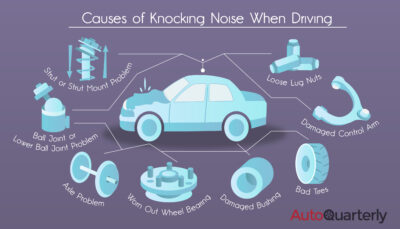Your vehicle will make several sounds that you should have been accustomed to hearing during regular operation. For example, when your automobile is operating properly, you hear a smooth hum from the engine and nothing else. But if you are getting grinding, clunking, slamming, screeching, or knocking noises, then there’s a problem with your car, and you need to check it out as soon as possible.
Several factors can be responsible for noises emanating from the driver’s side front wheel most common of which includes brakes, steering, or suspension problems.
Causes of Knocking Noise When Driving
There are several issues that can cause your vehicle to make noise when turning.
Strut or Strut Mount Problem
We’ll start with the strut mount. The strut mount connects the suspension strut to the car. While the vehicle is in motion, it absorbs tire noise and vibrations while stabilizing the steering mechanism. When driving on rough or bumpy roads, a knocking noise may be heard if the struts or strut mounts are worn out or damaged.
Ball Joint or Lower Ball Joint Problem
Ball joints connect a vehicle’s tires and wheels to the suspension system, allowing the tires and wheels to turn. A knocking noise may be heard whenever the car turns if the lower ball joint is significantly worn out or damaged. The noise is particularly noticeable whenever the vehicle is making a complete turn.
Axle Problem
The axle at the front of your automobile carries the weight of the whole front end of your vehicle. In most cases, your axle will last the entire life of your car without requiring any maintenance or repair. However, the axle can be damaged, particularly if you hit a severe pothole or something else on the road that gets trapped on the axle. A damaged axle, unlike certain other parts of your car, cannot be fixed. Instead, it has to be replaced.
Worn Out Wheel Bearing
Whenever your vehicle is in motion, wheel bearing allows your tire to spin smoothly and freely. However, if the wheel is badly worn out, the tires will turn with difficulty, resulting in knocking sounds. If it gets severe, your wheels may lock up and stop working.
Damaged Bushing
Bushings assist in keeping the vehicle aligned while driving. You may hear a knocking sound if the bushings are badly worn out or damaged due to metal-on-metal contact.
Bad Tires
Your tires have to be in good condition, be balanced, and well-aligned to ensure a smooth driving experience. If they are uneven or misaligned, or if one of the tires has a damaged belt, you may hear a knocking noise.
Loose Lug Nuts
Lug nuts secure the wheel to the vehicle. It’s possible that the lug nuts were not properly fastened to the wheel if the tires were recently changed. A knocking sound may be heard as a result of this.
Damaged Control Arm
As you drive over bumps in the road, your car’s control arms move up and down with your wheels. They are essential for maintaining vehicle stability when driving. Your ride will be exceedingly bumpy if your control arms are damaged. Your tires are even likely to bounce off the road as they go over uneven terrain.
Wrapping Up
When there’s a problem with your automobile, the noise it produces is one of the first and most apparent signs of trouble you’ll notice. You must be aware of how your car sounds during proper functioning so that you can recognize the noises it produces when something goes wrong. This prevents the problem from escalating and even costing you more.
Do yourself a favor and have the brakes, steering, and suspension examined by a professional automotive technician if you hear a knocking sound (or other unfamiliar sounds different from your vehicle’s usual hum) while driving.



